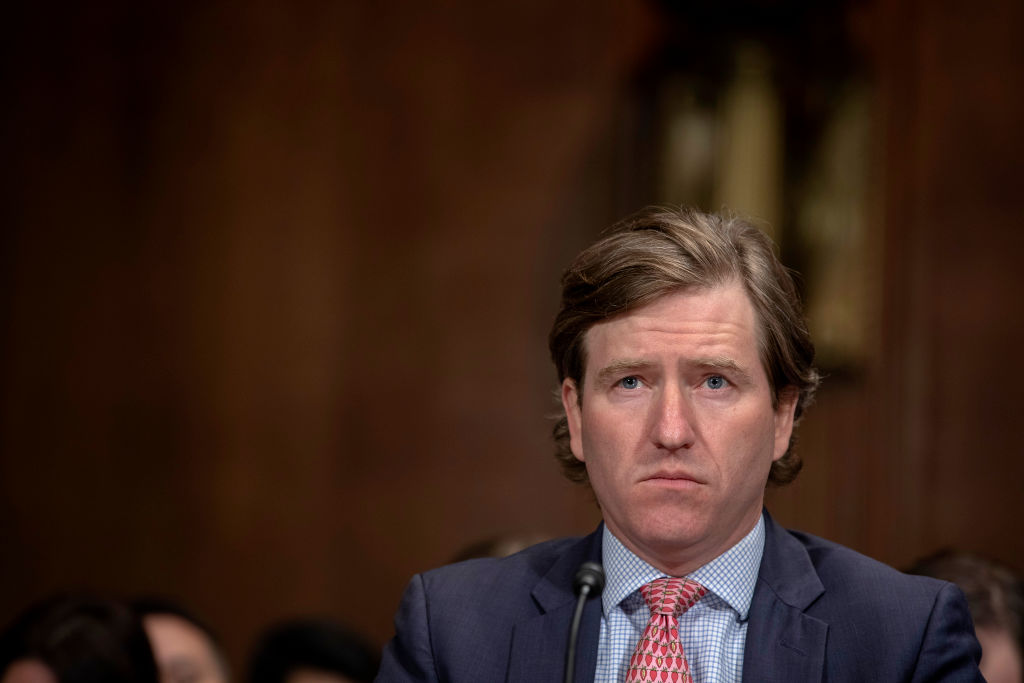Cybersecurity czar fired by Trump reportedly set up a Trump-proof line of succession


A free daily email with the biggest news stories of the day – and the best features from TheWeek.com
You are now subscribed
Your newsletter sign-up was successful
President Trump fired Christopher Krebs, the well-regarded director of the Department of Homeland Security's Cybersecurity and Infrastructure Security Agency (CISA), via tweet on Tuesday, citing Krebs' public assurances that the 2020 election was historically secure and free of fraud or serious error.
Krebs was the rare Trump administration official almost universally regarded as competent, apolitical, and effective in a crucial area that needed such leadership. And he apparently found a way to make sure his agency continued without too much political inference in the event he was fired. "Late Tuesday," The Washington Post said, "acting DHS Secretary Chad Wolf called Krebs' deputy, Matthew Travis, to inform him that the White House had overruled CISA's succession plan that named him acting director, essentially forcing him to resign, Travis said." A DHS spokesman said the White House did not directly ask Travis to step down.
With Travis out, CISA leadership goes to Brandon Wales, "a career employee whom Trump cannot fire," Politico says. "Mr. Krebs specifically created Mr. Wales' position as executive director to make it more difficult for the White House to install partisan replacements atop the agency," The Wall Street Journal reports, citing a person familiar with the matter.
The Week
Escape your echo chamber. Get the facts behind the news, plus analysis from multiple perspectives.

Sign up for The Week's Free Newsletters
From our morning news briefing to a weekly Good News Newsletter, get the best of The Week delivered directly to your inbox.
From our morning news briefing to a weekly Good News Newsletter, get the best of The Week delivered directly to your inbox.
Before joining the Trump administration in 2017, Krebs worked in the George W. Bush DHS then served as a lobbyist for Microsoft. In 2018 he was promoted to DHS undersecretary for the National Protection and Programs Directorate, which became CISA with legislation signed in November 2018. Krebs became the de facto "cyber czar" when the White House eliminated the cybersecurity coordinator position at the National Security Council. During his tenure, he worked not just on shoring up America's creaky election security but also on cybersecurity and ransomware threats at hospitals, utilities, and other critical infrastructure.
Krebs won widespread praise for increasing trust and cooperation with disparate federal agencies, hackers, and state and local election officials. He survived several shakeups at Trump's DHS, but his "Rumor Control" initiative to swat down election misinformation was evidently a bridge too far for Trump, whose misinformation Krebs repeatedly, if indirectly, debunked. "Honored to serve," Krebs tweeted after his firing. "We did it right. Defend Today, Secure Tomorrow."
A free daily email with the biggest news stories of the day – and the best features from TheWeek.com
Peter has worked as a news and culture writer and editor at The Week since the site's launch in 2008. He covers politics, world affairs, religion and cultural currents. His journalism career began as a copy editor at a financial newswire and has included editorial positions at The New York Times Magazine, Facts on File, and Oregon State University.
-
 ‘Restaurateurs have become millionaires’
‘Restaurateurs have become millionaires’Instant Opinion Opinion, comment and editorials of the day
-
 Earth is rapidly approaching a ‘hothouse’ trajectory of warming
Earth is rapidly approaching a ‘hothouse’ trajectory of warmingThe explainer It may become impossible to fix
-
 Health insurance: Premiums soar as ACA subsidies end
Health insurance: Premiums soar as ACA subsidies endFeature 1.4 million people have dropped coverage
-
 Ex-South Korean leader gets life sentence for insurrection
Ex-South Korean leader gets life sentence for insurrectionSpeed Read South Korean President Yoon Suk Yeol was sentenced to life in prison over his declaration of martial law in 2024
-
 Rubio boosts Orbán ahead of Hungary election
Rubio boosts Orbán ahead of Hungary electionSpeed Read Far-right nationalist Prime Minister Viktor Orbán is facing a tough re-election fight after many years in power
-
 Key Bangladesh election returns old guard to power
Key Bangladesh election returns old guard to powerSpeed Read The Bangladesh Nationalist Party claimed a decisive victory
-
 Epstein files topple law CEO, roil UK government
Epstein files topple law CEO, roil UK governmentSpeed Read Peter Mandelson, Britain’s former ambassador to the US, is caught up in the scandal
-
 Iran and US prepare to meet after skirmishes
Iran and US prepare to meet after skirmishesSpeed Read The incident comes amid heightened tensions in the Middle East
-
 EU and India clinch trade pact amid US tariff war
EU and India clinch trade pact amid US tariff warSpeed Read The agreement will slash tariffs on most goods over the next decade
-
 Israel retrieves final hostage’s body from Gaza
Israel retrieves final hostage’s body from GazaSpeed Read The 24-year-old police officer was killed during the initial Hamas attack
-
 China’s Xi targets top general in growing purge
China’s Xi targets top general in growing purgeSpeed Read Zhang Youxia is being investigated over ‘grave violations’ of the law
